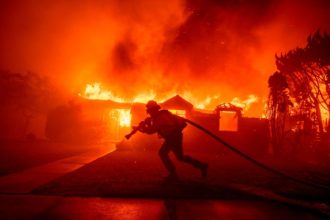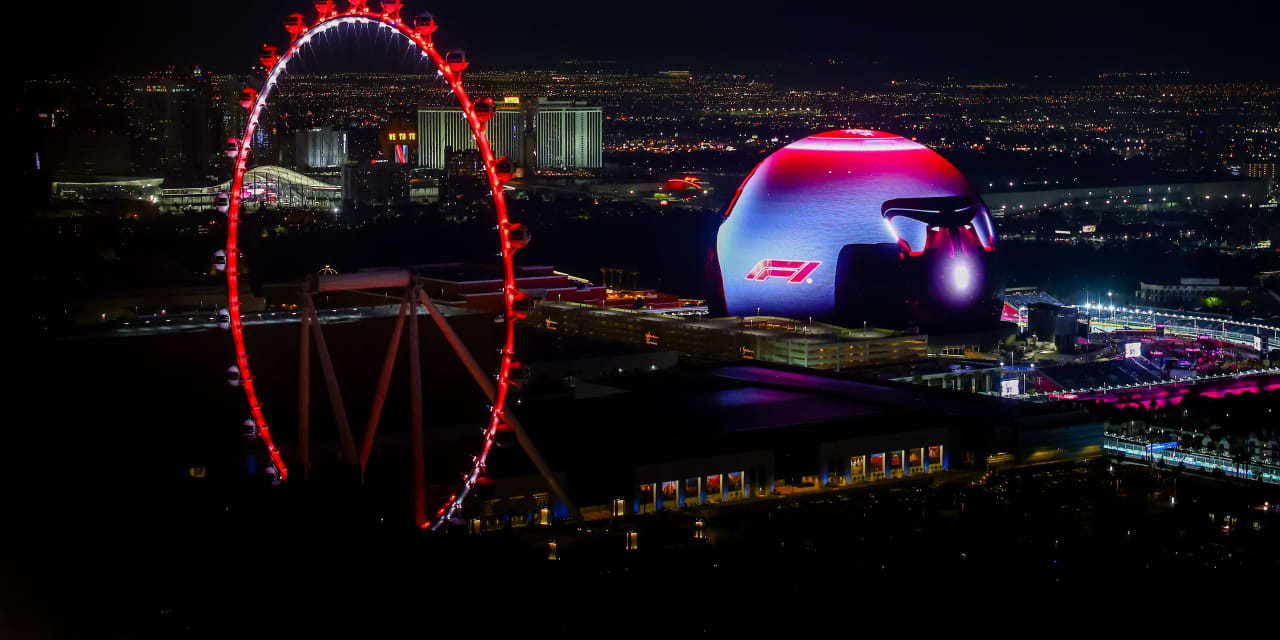As the tech world was meeting in Las Vegas this week, reveling in the hype and hoopla of CES 2024, Teddy Liaw was getting ready to head out of town.
“Vegas is not Sin City or the Strip. The innovation and fun is in the suburbs, the nearby mountains, Lake Mead, hiking trails,” Liaw said as he prepared for a trip to Chicago after spending the previous night at private CES events, pitching tech startups on the benefits of doing business in the desert.
“I am importing the first domino effect here — just as Elon Musk, Steve Jobs and Bill Gates did in creating tech ecosystems,” said Liaw, chief executive of NexRep, one of the largest at-home call-center platforms in the U.S. Liaw, who previously worked on a panel created by California Gov. Gavin Newsom to keep companies in that state, is the founder of the Vegas Tech Summit, which is targeting tech companies to relocate to the region.
His message seems to be resonating: Liaw is a major figure behind the organic rise of tech as an industry in entertainment-dominated Las Vegas. Part of the mystique is fostered by the sprawling, Super Bowl-like Consumer Electronics Show, which defines the local tech scene — albeit just for a few days — in early January. Now, developer conferences regularly come to the city, one whose entrepreneur community has been galvanized by tax incentives, a business-friendly government and some major regional infrastructure projects.
CES may get breathless coverage most of the week over AI and autonomous cars, but there is a longer-narrative arc playing out in the desert.
A transition from just tourism
Tech startups are decamping from Silicon Valley, Europe and elsewhere to take advantage of lower taxes, a pro-business local government, a large talent pool and proximity to California to create a blossoming digital economy among the flashy casinos, hotels and entertainment meccas on the Strip.
The transition is slowly happening in a city that is overwhelmingly identified with tourism and over-the-top escapism, not AI or software development.
“CES is just a few days. This is for years,” says Will Bright, chief executive of Saferide.ai Inc., a startup that creates AI-based software to keep existing cars from crashing. In 2020, he left the San Francisco Bay Area after a decade for Las Vegas.
Fueling the momentum is the ever-expanding presence of Amazon.com Inc.
AMZN,
and Tesla Inc.
TSLA,
; the continuing growth of Vegas as a destination for developer conferences from Amazon’s AWS, Adobe Inc.
ADBE,
ServiceNow Inc.
NOW,
and others; and infrastructure projects.
In early December, the Biden administration pledged $3 billion to Brightline West to develop a high-speed train from Vegas to California. Construction is scheduled to begin in 2024. The light-rail system will eventually be part of a $10 billion entertainment project that includes an NBA arena, hotel, and resort by 2028.
In October, the Clark County Commission approved plans to develop an innovation district of up to 20 acres in southwest Las Vegas.
“There is a shift. People used to come to California, but more advantageous regulations, quality of life, our proximity to California, and data centers have made our region very attractive,” said Shani Coleman, director of the Clark County Office of Community and Economic Development.
The gravitational pull of Vegas is palpable, especially from neighboring California. Nearly 50,000 Californians moved to Vegas between 2021 and 2022, according to the Census Bureau. In October 2022 alone, 7,100 people moved to Las Vegas, mostly from Los Angeles, according to Redfin Corp.
RDFN,
Further magnifying local fortunes are the move of venture-capital titan Ben Horowitz to the region, and ex-NFL star Colin Kaepernick starting a generative-AI company specializing in storytelling.
“Everybody comes to Vegas at least three times a year anyway for this convention or that convention. Business is being done. How do we get business to stay here?” said Liaw, who moved to Las Vegas from Silicon Valley a few years ago to create the Vegas Tech Summit, which woos executives, owners, founders and investors of major companies about the benefits of Las Vegas beyond the Strip.
The second annual conference took place in late October, two months before the bacchanal otherwise known as CES 2024.
“It’s more of a retreat,” Liaw said of the Vegas Tech Summit. “It’s small, it’s meant to be intimate, and it’s a great visual concept that, ‘Wow, I could be there.’”
Attracting business is priority one
Nevada has excelled as an entertainment and tourist hub, but only recently started prioritizing attracting business, and encouraging people to stay here and “build something great,” Coleman said.
“We always will be (reliant on hospitality and tourism). I think that’s reality, people need to understand, but is there an opportunity to shift that percentage,” she added.
While the newly opened Sphere concert venue, the Fontainebleau Las Vegas luxury hotel, the recent Formula 1 race, the upcoming Super Bowl and an influx of pro sports teams have added a sheen to one of the country’s fastest-growing cities, its fast-evolving tech industry has stayed under the radar.
Jay Vickers, chief operating officer for the Sports Innovation Institute at UNLV, noted the tech surge is occurring simultaneously with a sports renaissance — the Oakland A’s are moving to the region, and an NBA franchise is expected to follow.
“Las Vegas is portrayed in a mocking manner, but it is an urban intellectual business hub,” Bo Bernhard, vice president of economic development at UNLV, said in an interview. “We are in the midst of a fun economy that intersects tourism, sports, and entertainment.”
“Las Vegas is about 80% entertainment and hospitality, and 15% tech,” said Bright, who founded Saferide about a year ago. “At the start of the pandemic, I went to tech events in Vegas, and it would be 10 to 15 people. Now, it’s 70 to 100 people at the same type of events.”
One lucrative carrot luring entrepreneurs to the Silver State is the lack of state income tax. It was mentioned by several interviewed for this story.
“Vegas felt right. The government there is putting a lot of effort (tax incentives, matching programs, access to decision-makers) into bringing people here,” Darrick Horton, co-founder and CEO of TensorWave, said in an interview. His fast-growing AI-compute provider was recently founded in Las Vegas after considering Silicon Valley, Miami, Boston and New York.
“There is a lot of activity in Nevada, transplants from California, a lot of money and capital, a lot of data-center projects and access to more and more technical talent,” Horton said, ticking off the advantages of southwest Nevada.
Las Vegas, then and now
There have been plays for Sin City before. The late Tony Hseih, CEO of Zappos, valiantly tried to reshape downtown Las Vegas in the mid-2010s. He invested $350 million of his fortune into a grand plan to revitalize downtown into a pre-eminent location for technology startups, co-working space and the arts.
Read more: Turning Vegas into a hot spot for work
Like Detroit and other cities, Vegas was then wrestling with the future of its hollowed-out downtown. The audacious vision, which Hsieh hoped to pull off in just a few years, would have infused the desolate downtown with sparkling new workplaces, housing and cultural destinations. But it sputtered — the latest misfire to rejuvenate that part of the city.
At the time, one Zappos employee asked a reporter to walk her and her son to a parking lot near the company’s offices in downtown Las Vegas during the day, out of fear.
Fast-forward to 2024 and it’s a much different city. In the past decade-plus, the city has swelled to a population of about 650,000 and the skyline has undergone a dramatic facelift that includes the iconic Sphere, Allegiant Stadium, a new tech district, the proposed light-rail system to California and T-Mobile Arena.
“Las Vegas is the best trade-show city in the world. I have no problem with other tech shows here,” said Gary Shapiro, CEO of the Consumer Technology Association, the organization that owns and produces CES. This week’s extravaganza, which will emphasize AI and car technology, is expected to draw more than 3,500 exhibitors from around the world, with an estimated 130,000 attendees.
CES, a Las Vegas staple since 1979, peaked at 182,000 attendees in 2019 before plummeting in 2020 because of COVID-19. Sphere officials plan multiple showings of “Postcard from Earth,” the Darren Aronofsky film, during CES’s four-day run, but there are no CES-specific events planned at the orb.
The lure of a reasonable cost of living
Liaw believes there is just as much going on in Vegas during CES week among “people without [convention] badges.”
The appeal of Las Vegas for tech professionals who have recently migrated often comes down to basic economics and a reasonable cost of living, according to startup founders and their employees.
Vlad Suteu made the move from Romania last year to establish an office for Shift Studio, a software-development company based in Salt Lake City. “I’ve been coming to Vegas since 2015-’16 to conferences. Obviously, you learn there is more here than the Strip and convention centers,” Suteu, who is chief innovation officer, said in an interview.
“Friends of mine from Google are paying $10,000 a month in rent” in Silicon Valley, Suteu said. “During COVID, when they weren’t asked to come into the office, they began to wonder, ‘Why pay so much when I can work anywhere?’”
Read the full article here





